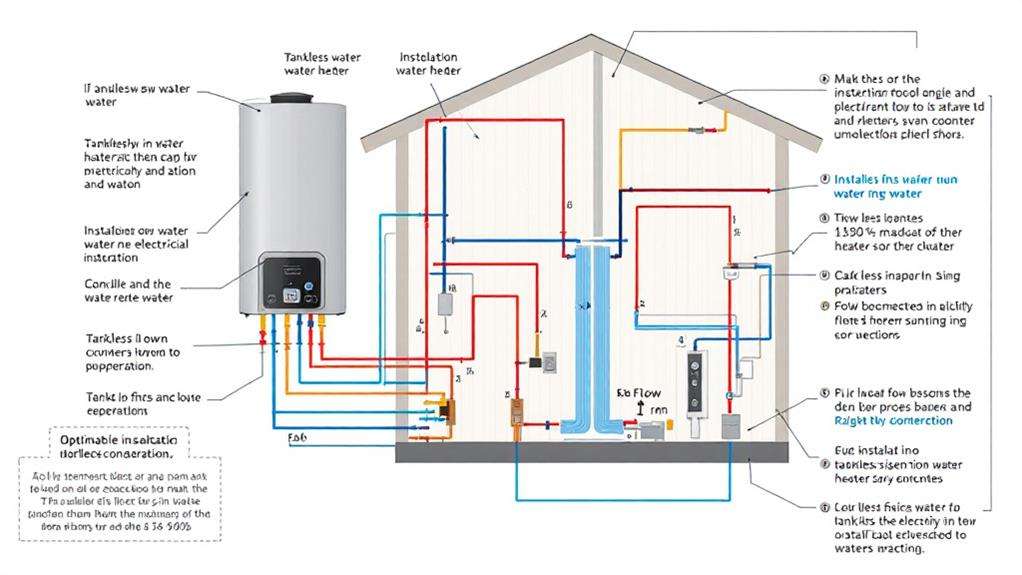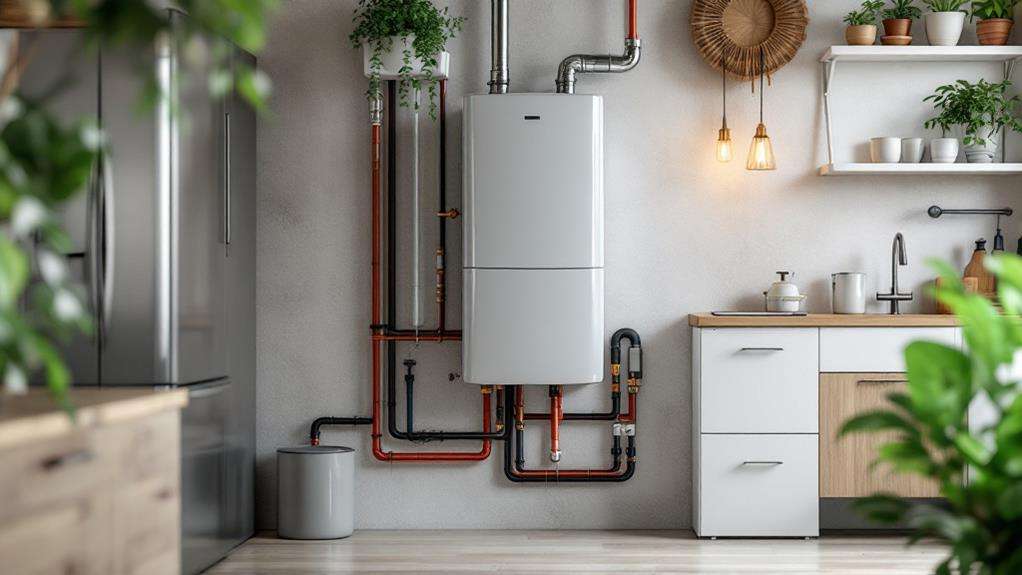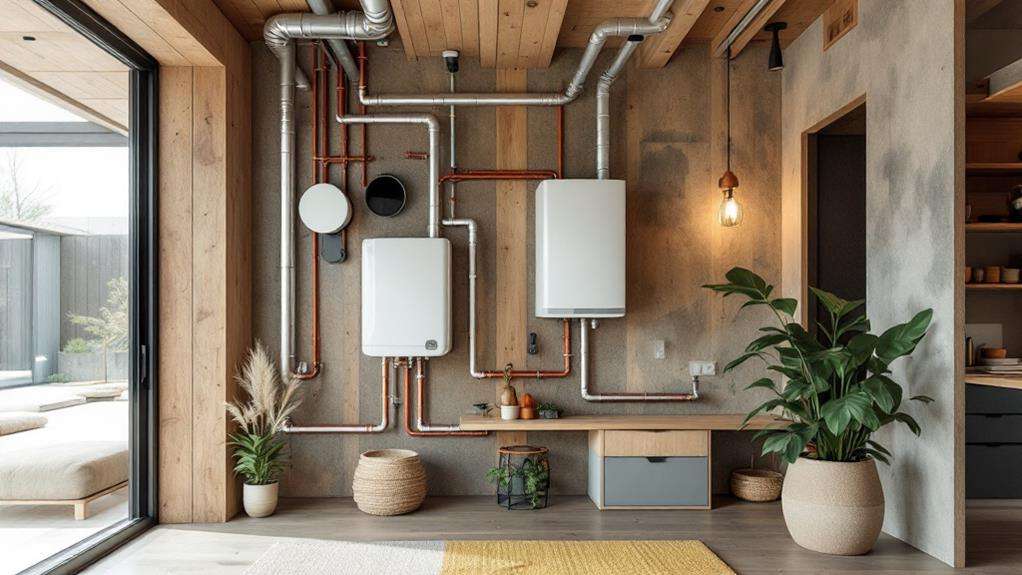Tankless Water Heaters: What You Need to Know Before Buying
Tankless water heaters offer on-demand hot water, higher energy efficiency, and longer lifespans than traditional tanks. But to get the most from a tankless system, you'll need to carefully consider your household's hot water needs, choose the right fuel type and capacity, and plan for proper installation and regular maintenance. Upfront costs are higher, but you can offset this with long-term energy savings and financing options. And by upgrading to a tankless unit, you can enjoy the benefits of instant hot water in your existing home. Knowing these key factors will help ensure you select the best tankless water heater for your needs.
Key Takeaways
- Determine your household's hot water demand to select the appropriate tankless water heater capacity.
- Evaluate fuel type options (electric, gas, or propane) and prioritize energy efficiency with high energy factor (EF) ratings.
- Understand the proper ventilation requirements and account for any necessary electrical capacity upgrades.
- Anticipate higher upfront installation costs but expect long-term energy savings to offset the initial investment.
- Ensure proper clearances and access for installation, and coordinate with licensed professionals for a smooth retrofit process.
Understanding Tankless Water Heaters
Tankless water heaters, also known as on-demand water heaters, are a popular alternative to traditional tank-based systems. Unlike their tank-based counterparts, tankless water heaters don't store hot water, but instead heat water instantly as it's needed. This instantaneous heating performance means you'll enjoy a consistent water temperature, without the fluctuations often experienced with tank heaters.
Tankless water heaters are designed to be compact and wall-mounted, freeing up valuable floor space in your home. They're also incredibly energy-efficient, using gas or electricity to heat water only when you need it, rather than constantly maintaining the temperature of a large tank. This can translate to significant cost savings on your energy bills over time.
When it comes to water temperature consistency, tankless water heaters excel. They can provide a continuous supply of hot water, ensuring you never run out, even during high-demand periods. This makes them an excellent choice for larger households or homes with multiple bathrooms.
Benefits of Tankless Water Heaters
One of the most prominent benefits of tankless water heaters is their energy efficiency. These units only heat water on demand, eliminating the standby energy consumption associated with traditional tank-style heaters. This can lead to a significant reduction in your overall energy consumption and lower utility bills. Additionally, tankless water heaters are much more compact than their tank-based counterparts, freeing up valuable floor space in your home. This space-saving benefit is particularly useful for homeowners with limited square footage or who want to optimize their home's layout.
Moreover, tankless water heaters have a longer lifespan than traditional tank heaters, typically lasting 20 years or more with proper maintenance. This means you can enjoy the benefits of an energy-efficient, space-saving water heater for many years to come. With their impressive efficiency and practical advantages, it's easy to see why tankless water heaters are becoming an increasingly popular choice for homeowners.
Sizing and Installation Considerations

When selecting a tankless water heater, properly sizing the unit is crucial. The size of the heater should match your household's water flow requirements. You'll need to consider factors like the number of bathrooms, appliances, and the maximum number of fixtures that may run simultaneously.
- Evaluate your home's hot water usage patterns to determine the necessary flow rate, usually measured in gallons per minute (GPM).
- Choose a tankless model that can meet the peak hot water demand in your home.
- Ensure the heater can provide enough hot water for tasks like showering, laundry, and dishwashing without running out.
- Account for the exhaust ventilation needs, as tankless units require proper venting to function efficiently and safely.
Proper installation is also vital for the optimal performance and longevity of your tankless water heater. Work with a qualified professional to ensure the unit is correctly sized, installed, and integrated into your home's plumbing and electrical systems.
Fuel Type and Energy Efficiency
In addition to properly sizing your tankless water heater, you'll also need to consider the fuel type and energy efficiency when making your selection. Tankless water heaters can be powered by electricity, natural gas, or propane. Electric models are generally more energy-efficient, but they may have higher utility costs due to the higher electricity rates in some areas. Gas-powered tankless heaters, on the other hand, can be more cost-effective to operate, but they may have a larger environmental impact due to the emissions associated with burning fossil fuels.
When evaluating energy efficiency, look for tankless water heaters with high energy factor (EF) ratings, as these models will be more efficient and cost-less to operate. Additionally, consider the climate in your region, as more efficient models may be necessary in colder climates to maintain the desired water temperature. Ultimately, balancing fuel type, energy efficiency, and utility costs will help you select the best tankless water heater for your home.
Maintenance and Lifespan

Proper tankless water heater maintenance and an understanding of their typical lifespan are crucial factors to consider. You'll need to stay on top of regular upkeep to ensure your tankless system runs smoothly and efficiently for years to come.
One of the primary maintenance concerns is scale buildup and mineral deposits. These can accumulate inside the heat exchanger, reducing its effectiveness and potentially leading to costly repairs. To combat this, you'll want to:
- Flush the system regularly, following the manufacturer's recommendations
- Use a descaling solution to remove any mineral deposits
- Install a water softener if you have hard water in your area
- Consider adding a scale-reduction filter
Tankless water heaters typically last 15-20 years with proper care, far exceeding the 8-12 year lifespan of traditional tank-style models. By staying proactive with maintenance, you can get the most out of your investment and enjoy continuous, energy-efficient hot water for the long haul.
Costs and Financing Options
Considering the upfront costs, investing in a tankless water heater may require a more substantial financial commitment than a traditional tank model. Typically, the initial installation costs for a tankless system can be 2-3 times higher than a standard tank heater. However, the long-term savings on your energy bills can make up for this difference over time.
To help offset the upfront costs, many manufacturers and local utility companies offer financing plans or rebates. These plans allow you to spread the installation costs over several years, making the transition to a tankless system more manageable. Additionally, some homeowners may qualify for federal, state, or local tax credits or incentives when upgrading to an energy-efficient tankless water heater.
Carefully evaluate your budget and explore the various financing options available to determine the best solution for your home and your wallet. The higher initial investment can pay off in the long run through reduced energy consumption and prolonged lifespan of your tankless water heater.
Retrofitting Existing Homes

Retrofitting an existing home with a tankless water heater can present some unique challenges, but the process is often straightforward. One of the key considerations is the home's electrical requirements. Tankless units typically need a higher-amperage electrical circuit, so you may need to upgrade your home's electrical panel to accommodate the increased power demand. Another important factor is venting considerations. Tankless heaters often require specialized venting systems to ensure proper air intake and exhaust, which can mean modifying your home's existing ductwork or installing new venting.
- Assess your home's electrical capacity and upgrade if necessary
- Evaluate your home's venting requirements and make necessary modifications
- Ensure proper clearances and access for the tankless unit's installation
- Coordinate with licensed plumbers and electricians for a seamless retrofit
With the right planning and professional installation, retrofitting your existing home with a tankless water heater can be a smooth and efficient process, providing you with the benefits of on-demand hot water.
Comparison to Traditional Tank Models
Tankless water heaters offer a number of advantages over traditional tank models. One key difference is their space requirements. Tankless units are compact, wall-mounted, and don't take up valuable floor space like bulky tanks. This makes them an ideal choice for homes with limited space. Additionally, tankless heaters provide energy savings. Since they only heat water on demand, they don't constantly maintain a full tank of hot water, reducing your energy consumption and utility bills.
Another benefit is their long lifespan. Tankless models typically last 20 years or more, twice as long as traditional tank heaters. And they offer endless hot water, as they heat water instantaneously rather than storing a finite supply. This means you'll never run out of hot water, even with multiple simultaneous uses. The upfront costs may be higher, but the long-term savings and benefits often make tankless water heaters a worthwhile investment for many homeowners.
